Footy Fix: Ross Lyon is the AFL's most boring coach once again - and it's suffocating the Saints' season
On the scoreboard, it looks like a creditable St Kilda performance. A loss to a Port Adelaide outfit many see as a premiership contender…
Opinion
Many well-respected journalists have put together their own teams of the decade in the last few months, taking into account games played, awards won and goals kicked.
That is all well and good, but no-one has considered the most important system of all: SuperCoach.
So I present to you a team of the decade that I’m sure will raise plenty of controversy both inside the walls of the Jock Reynolds conference room but also spread throughout the wider Jock Reynolds community.
Defender 1: Heath Shaw (Collingwood and GWS), 2010-19
2010: 90.2 (19)
2011: 100.9 (14)
2012: 101.2 (18)
2013: 96.9 (19)
2014: 92.6 (18)
2015: 112.6 (22)
2016: 106 (22)
2017: 83.3 (22)
2018: 90.7 (20)
2019: 82.6 (22)
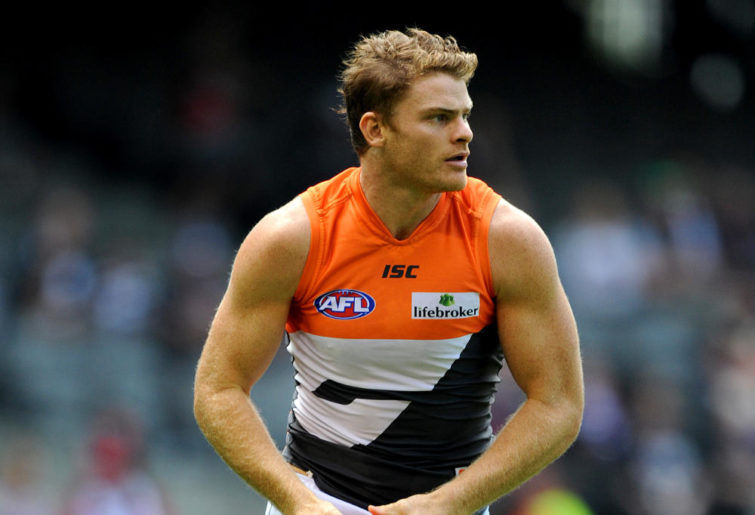
(AAP Image/Joe Castro)
During his time at Collingwood Heath Shaw was a lock for your D1 position. His productivity dropped once he moved to GWS, as he had to share his rebounding role with Zac Williams, Lachie Whitfield, Nick Haynes and Nathan Wilson. Four seasons averaging 100-plus, with four more in the 90s means he was a reliable pick for a long time and has earned the D1 spot for the decade.
Defender 2: Brendon Goddard (St Kilda and Essendon), 2010-18
2010: 130.2 (21)
2011: 107.9 (22)
2012: 101.2 (20)
2013: 06.1 (22)
2014: 102.1 (19)
2015: 97.2 (22)
2016: 97.8 (20)
2017: 97.4 (22)
2018: 78.5 (22)
Goddard didn’t play out the entire decade, but nine seasons with the lowest game count being 19 made him a very reliable player to have in your side. He was also a dual position player, so slotting him into your side was much easier when he was defender-midfielder eligible. Five from nine seasons averaging 100-plus, including a massive 130.2, locks him into this backline.
Defender 3: Matthew Boyd (Western Bulldogs), 2010-17
2010: 106.3 (20)
2011: 115.5 (22)
2012: 113.2 (22)
2013: 103.8 (13)
2014: 97.9 (19)
2015: 103.9 (18)
2016: 103.7 (20)
2017: 77.9 (10)
Matthew Boyd is another who didn’t play out the whole decade, as his career finished in 2017. He was impossible to leave out, though, with six of his eight seasons this decade being in the 100-plus average category. Only his last season was a subpar average of 77.9, but his career was in a decline and he only managed ten games.
Defender 4: Kade Simpson (Carlton) 2010-19
2010: 99.8 (22)
2011: 94.5 (22)
2012: 93.7 (19)
2013: 95.1 (22)
2014: 95.4 (22)
2015: 92.7 (20)
2016: 106.4 (22)
2017: 93.9 (22)
2018: 105 (21)
2019: 81.5 (18)
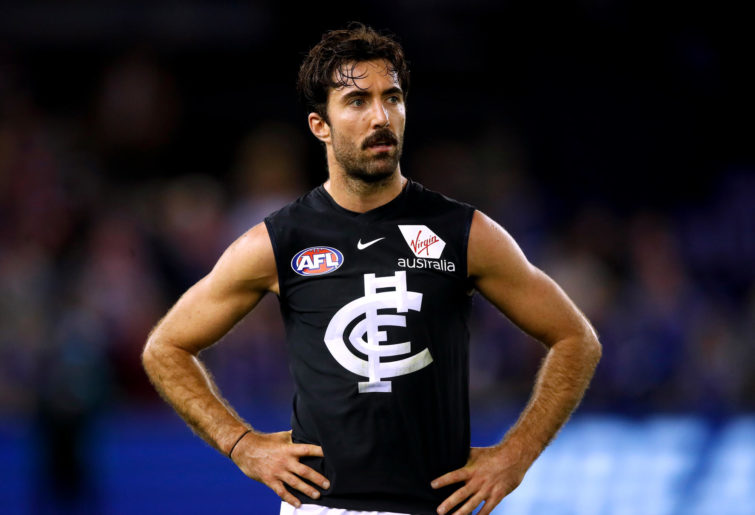
(Adam Trafford/AFL Media/Getty Images)
Simpson has been a consistently strong scorer for over a decade now, but since 2010 he’s averaged sub-90 just once: this year. Only two 100-plus average seasons, however, means he’s the sort of player that you could lock in Round 1 and play him every week.
Defender 5: Bryce Gibbs (Carlton and Adelaide), 2010-19
2010: 104.5 (22)
2011: 103.0 (22)
2012: 95.3 (22)
2013: 95.4 (19)
2014: 106.2 (22)
2015: 82.4 (10)
2016: 106.1 (22)
2017: 102.4 (22)
2018: 96.5 (22)
2019: 69.1 (12)
Despite being on the outer at Adelaide in 2019, Gibbs has been a highly effective SuperCoach option this decade. Not only has he rarely missed games (15 in 2010-18), he has also scored at a great rate.
Defender 6: Sam Mitchell (Hawthorn and West Coast) 2010-17
2010: 98.9 (18)
2011: 113.5 (20)
2012: 110.8 (21)
2013: 104.2 (21)
2014: 91.2 (13)
2015: 108.7 (20)
2016: 104.4 (20)
2017: 94.1 (20)
Arguably one of the most skilful players in recent memory, Mitchell was utilised off the half-back in the latter half of his career at Hawthorn. His decision-making and ability to use both sides of his body at a great standard made this transition flawless, and he excelled, with five of his eight seasons averaging 100-plus, with none lower than 91.
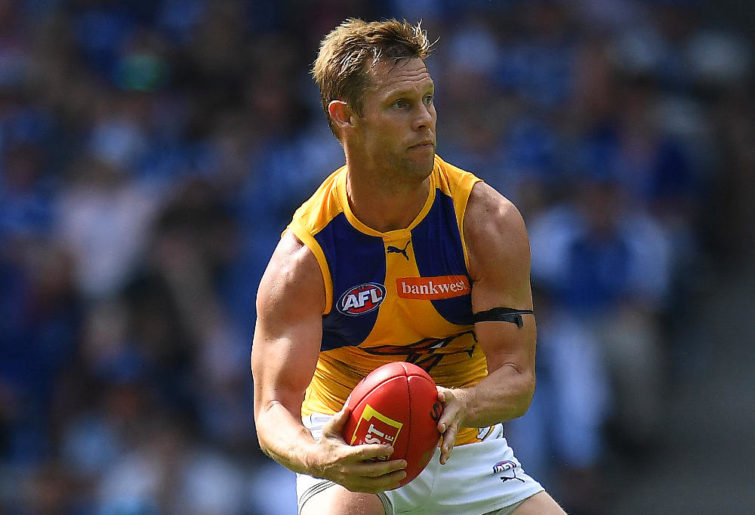
(AAP Image/Julian Smith)
Defender 7: Leigh Montagna (St Kilda) 2010-17
2010: 114.8 (22)
2011: 100.7 (20)
2012: 99.2 (22)
2013: 114.8 (21)
2014: 89.4 (20)
2015: 111.0 (17)
2016: 98.9 (22)
2017: 89.5 (16)
Montagna was a player you could almost slot anywhere on the ground, as over his career he was eligible everywhere except ruck. Three seasons out of the eight he played this decade with averages over 110, with the other five slotting in the 89 to 101 range, which meant you knew exactly what you were getting from Leigh, and this consistency provides great bench cover for this decade.
Defender 8: Rory Laird (Adelaide) 2013-19
2013: 69.8 (18)
2014: 59.1 (16)
2015: 93.8 (21)
2016: 96.8 (17)
2017: 100.2 (22)
2018: 108.2 (20)
2019: 96.8 (22)
The youngest member of this backline, Laird is one of the elite half-backs in the league at the moment. He’s only had two seasons of 100-plus averages, but he hasn’t averaged under 93 since his second season in the competition, which is enough to find himself a spot to warm the bench.
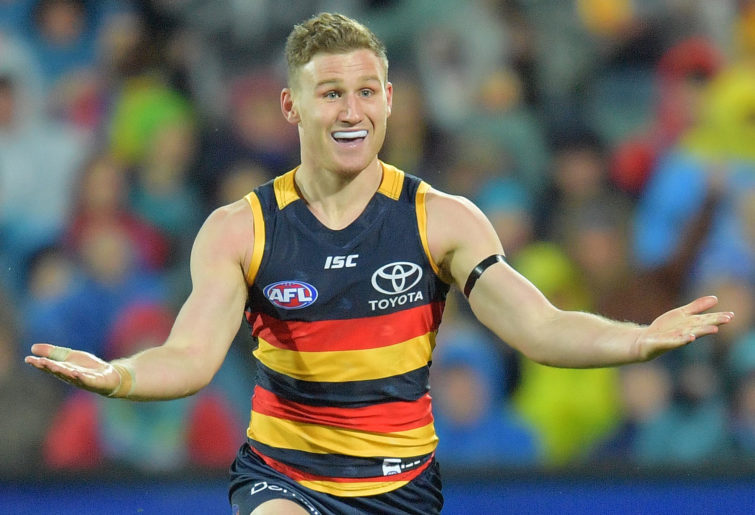
(AAP Image/David Mariuz)
Midfielder 1: Scott Pendlebury (Collingwood) 2010-19
2010: 110.5 (22)
2011: 129.2 (22)
2012: 124.7 (18)
2013: 126.6 (22)
2014: 124.4 (21)
2015: 116.2 (22)
2016: 118.7 (22)
2017: 106.7 (16)
2018: 103.5 (21)
2019: 104.3 (22)
Call it controversial, but Scott Pendlebury edges out Gary Ablett for the best SuperCoach midfielder of the decade in a closely fought contest. Four seasons of 124-plus, plus three 110 to 120 seasons and none under 103 means his ability to get on the park and put on a great performance week in, week out gives him the edge.
Midfielder 2: Gary Ablett, captain (Geelong and Gold Coast), 2010-19
2010: 129.9 (21)
2011: 127.1 (20)
2012: 138.4 (20)
2013: 128.9 (21)
2014: 136.7 (15)
2015: 115.5 (6)
2016: 114.1 (14)
2017: 114.8 (14)
2018: 106.9 (18)
2019: 95.7 (21)
For Gary, the numbers are similar to Scott Pendlebury. Five seasons of scoring 127-plus and three seasons averaging between 114 and 115.5. However, he missed a lot more games than Pendlebury, and with a sub-100 average this past season, Gary falls to No. 2. He still holds the spot as my captain for the decade as his ability to go huge is better than anyone else’s.
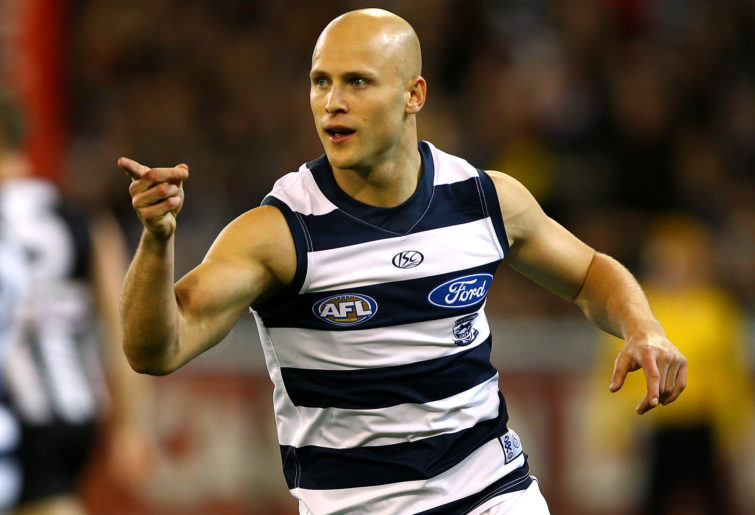
(Mark Dadswell/Getty Images)
Midfielder 3: Joel Selwood (Geelong) 2010-19
2010: 117.8 (21)
2011: 111.5 (17)
2012: 117.7 (20)
2013: 118.4 (22)
2014: 120.9 (22)
2015: 104.8 (20)
2016: 111.5 (22)
2017: 102.2 (18)
2018: 105.1 (22)
2019: 85.8 (20)
Selwood divides opinion thanks to his playing style, but you can’t question his ability to score SuperCoach points this decade. In six of his ten seasons he scored 110-plus, he had three seasons in the 100s and put in just one season (2019) averaging sub-triple digits.
Midfielder 4: Patrick Dangerfield (Adelaide and Geelong) 2010-19
2010: 69.9 (19)
2011: 80.3 (22)
2012: 118.9 (22)
2013: 112.9 (20)
2014: 105.6 (22)
2015: 119.9 (21)
2016: 131.8 (22)
2017: 136.4 (21)
2018: 121.7 (21)
2019: 115.2 (21)
It speaks volumes of Geelong’s dominance this decade that the team has three midfielders holding positions in this team of the decade. Dangerfield has been electric since 2012, with only one season below 112. The first two seasons of the decade were still while he was young, which is why he’s not higher on the list.
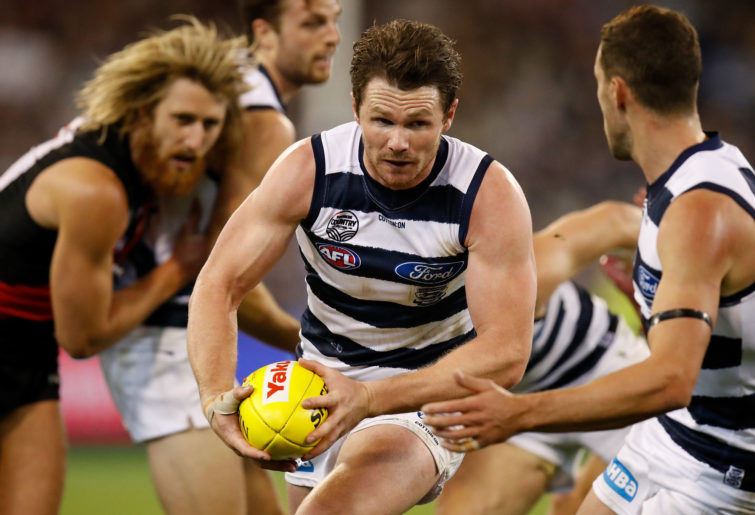
(Michael Willson/AFL Media/Getty Images)
Midfielder 5: Nat Fyfe (Fremantle), 2010-19
2010: 72.6 (16)
2011: 108.0 (21)
2012: 93.2 (9)
2013: 106.5 (19)
2014: 122.3 (18)
2015: 124.3 (18)
2016: 105.4 (5)
2017: 108.8 (21)
2018: 113.9 (15)
2019: 120.0 (20)
Two Brownlow Medals and plenty of captain-worthy performances have earnt Fyfe a place among the best. Three seasons above 120 points per game and with five more above 100 has made Fyfe a must-have player for most of his career.
Midfielder 6: Josh Kennedy (Sydney) 2010-19
2010: 81.0 (22)
2011 96.1 (22)
2012: 120.2 (22)
2013: 105.4 (22)
2014: 113.9 (20)
2015: 110.2 (22)
2016: 113.4 (21)
2017: 102.6 (19)
2018: 96.8 (22)
2019: 106.6 (22)
JPK has been a model of consistency this decade, missing only six games in ten seasons. In that time he also averaged 100-plus points seven times, with four of those years 110-plus. The Swans skipper has been a popular selection yet never a must-have player for the last decade.
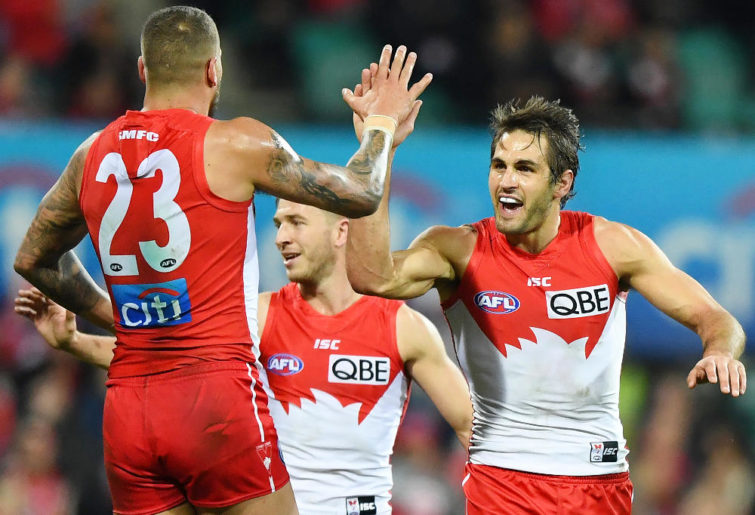
(AAP Image/David Moir)
Midfielder 7: Matt Priddis (West Coast) 2010-17
2010: 108.8 (19)
2011: 114.1 (22)
2012: 110.0 (20)
2013: 101.0 (21)
2014: 112.7 (22)
2015: 113.3 (22)
2016: 109.1 (21)
2017: 93.4 (19)
One of the most surprising Brownlow medalists in recent memory, Priddis sudden rise to stardom matched his sudden retirement. It seemed Priddis was still capable of being a reliable footballer as well as SuperCoacher for at least a couple more years. Only one of his eight seasons were sub-100, with six seasons over 108.
Midfielder 8: Dayne Beams (Collingwood and Brisbane) 2010-19
2010: 84.9 (21)
2011: 100.8 (14)
2012: 122.9 (21)
2013: 102.4 (7)
2014: 115.5 (19)
2015: 113.4 (16)
2016: 79.5 (2)
2017: 101.4 (19)
2018: 102.7 (21)
2019: 81.3 (9)
Setting aside an injury-riddled 2016 in which he managed only two games, Beams had a very productive patch from 2011 until 2018. Every season barring 2016 was above 100 points per game, with the seasons to start and end the decade the only true downers. This decade is enough for Beams to fill the final spot on the field.
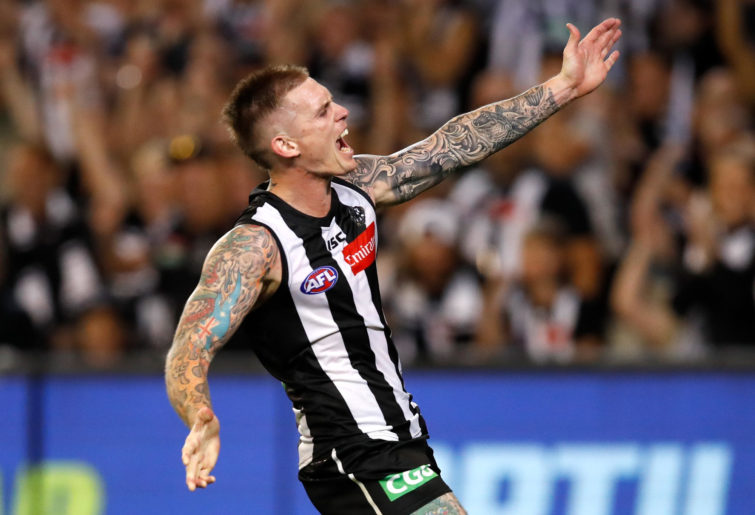
(Dylan Burns/AFL Photos)
Midfielder 9: Rory Sloane (Adelaide) 2010-19
2010: 75.2 (14)
2011: 88.3 (18)
2012: 106.1 (21)
2013: 107.0 (21)
2014: 114.8 (22)
2015: 105.5 (16)
2016: 108.6 (21)
2017: 110.2 (22)
2018: 96.6 (12)
2019: 103.0 (22)
The Adelaide skipper has led by example for many years, averaging less than 103 in only one season (2018) since 2011. The first two seasons of the decade were a bit of a let-down, but he was still young. His consistency on the field gets him a spot as first emergency.
Midfielder 10: Marc Murphy (Carlton) 2010-19
2010: 111.9 (21)
2011: 118.0 (22)
2012: 112.7 (16)
2013: 92.4 (21)
2014: 106.0 (20)
2015: 103.2 (19)
2016: 79.5 (10)
2017: 108.2 (22)
2018: 92.4 (13)
2019: 90.7 (19)
Former Blues captain Marc Murphy led the club through some truly awful times. Despite this, in six of his ten seasons he averaged over 100, with only one year below 90.
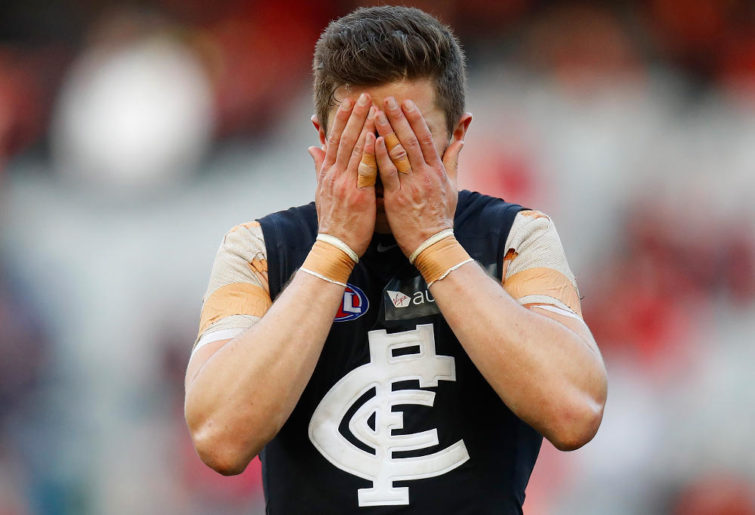
(Michael Willson/AFL Media/Getty Images)
Midfielder 11: Steele Sidebottom (Collingwood) 2010-19
2010: 84.4 (21)
2011: 83.5 (22)
2012: 106.2 (21)
2013: 103.0 (22)
2014: 113.9 (19)
2015: 104.2 (16)
2016: 106.2 (20)
2017: 96.0 (22)
2018: 101.6 (22)
2019: 94.3 (21)
Personally this one surprised me a bit, but six seasons of 100-plus points and two in the 90s made Sidebottom one of the more consistent players of the decade.
Ruck 1: Todd Goldstein (North Melbourne) 2010-19
2010: 65.8 (21)
2011: 113.2 (21)
2012: 93.0 (20)
2013: 113.5 (22)
2014: 106.9 (21)
2015: 128.8 (21)
2016: 108.1 (21)
2017: 94.8 (19)
2018: 101.0 (22)
2019: 112.2 (22)
Goldy has had a superb decade, with seven seasons averaging at least 100. He was the highest-scoring player in 2015 with an average of 128.8.
Ruck 2: Shane Mumford (Sydney and GWS) 2010-17, 2019
2010: 92.6 (19)
2011: 112.6 (17)
2012: 90.9 (14)
2013: 91.9 (19)
2014: 114.2 (17)
2015: 105.7 (11)
2016: 98.6 (21)
2017: 98.3 (20)
2018: 0 (0)
2019: 81.6 (16)
Big Mummy had a ripper decade, and despite retiring for a year he deserves a spot in the side. He may have had only three 100-plus seasons, but only in 2019 was h3 below 90 a game on average. Plenty of people are going to be annoyed about the absence of Brodie Grundy and Max Gawn (or perhaps both!), but their rise to dominance was late in the decade and they just didn’t have enough years to justify a starting spot.
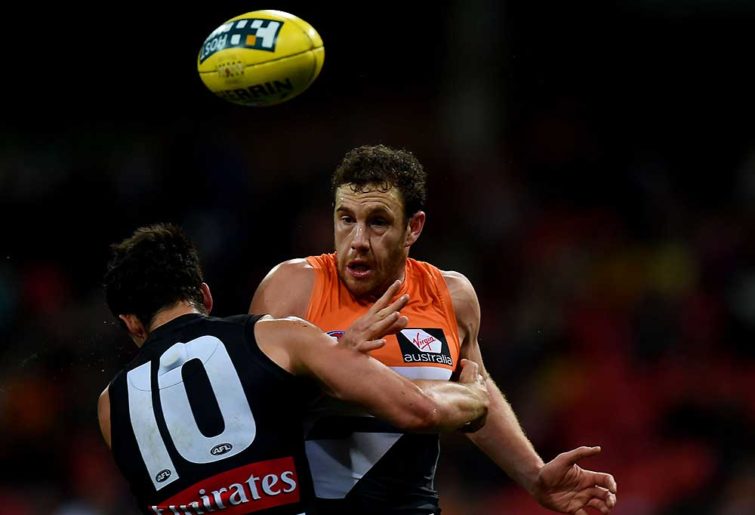
(AAP Image/Tracey Nearmy)
Ruck 3: Aaron Sandilands (Fremantle) 2010-19
2010: 114.0 (19)
2011: 110.8 (13)
2012: 112.6 (12)
2013: 64.0 (7)
2014: 108.0 (21)
2015: 107.8 (21)
2016: 70.8 (5)
2017: 87.3 (10)
2018: 97.5 (11)
2019: 85.3 (6)
I know, I have angered you all. But before you crucify me, please look at the statistics. Sandilands has played 125 games since the start of 2010. Gawn has played 120 and Grundy has played 125. Yes, Grundy has had two seasons of 130-plus averages, but they’re his only two averages above 100. Gawn has four seasons above 100, with two over 120, but Sandilands has five 100-plus seasons and three of 110-plus.
Sandy also has three seasons between 80 and 100, while Gawn has one and Grundy has three. He also has only two seasons sub-80, whereas Gawn has three and Grundy has two. Therefore, based purely on consistency over the decade, Sandilands just edges out the two best current ruckmen in the competition.
Forward 1: Dustin Martin (Richmond) 2010-19
2010: 77.9 (21)
2011: 98.9 (22)
2012: 88.5 (20)
2013: 101.8 (22)
2014: 99.5 (21)
2015: 105.5 (22)
2016: 108.1 (22)
2017: 119.3 (22)
2018: 103.9 (21)
2019: 100.0 (20)
Whilst Dusty has been a popular midfield selection since debuting in 2010, he is much more popular when he’s selectable as a dual position player. It seems that every second year he swaps between the midfield and midfield and forward, with 2020 another year of dual eligibility. In six of the last seven years he’s recorded a 100-plus average, with only his debut year under 88 points per game.
Forward 2: Brett Deledio (Richmond and GWS) 2010-19
2010: 101.9 (22)
2011: 104.9 (22)
2012: 116.6 (22)
2013: 103.6 (22)
2014: 102.9 (18)
2015: 112.8 (17)
2016: 95.0 (11)
2017: 77.2 (4)
2018: 85.4 (9)
2019: 77.8 (13)
Deledio is another player who has benefited SuperCoach players due to his versatility on the ground. He has featured as defender-midfield, a midfielder-forward, a midfielder and a defender-forward in his career, but he slots into our side as a forward option. Six seasons of 100-plus scores to start the decade before his body fell apart, Deledio was a classy player when he could get on the park.
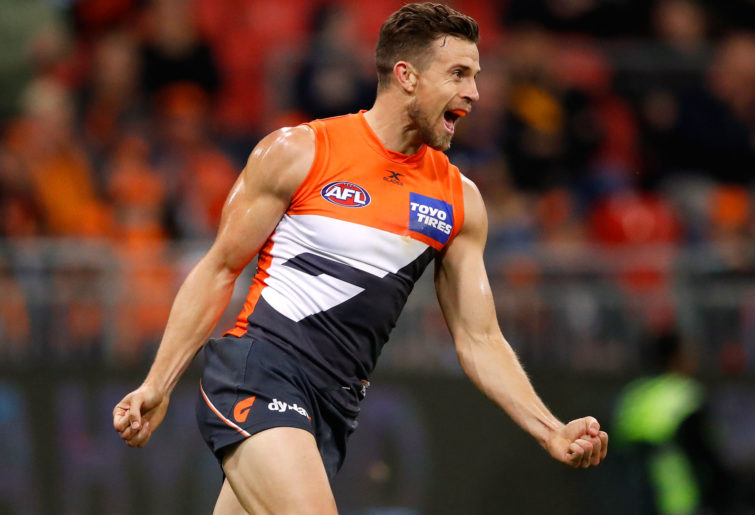
(Adam Trafford/AFL Media/Getty Images)
Forward 3: David Mundy (Fremantle) 2010-19
2010: 93.7 (20)
2011: 107.1 (12)
2012: 89.2 (20)
2013: 103.7 (19)
2014: 102.2 (22)
2015: 113.5 (21)
2016: 93.2 (18)
2017: 89.4 (21)
2018: 96.0 (22)
2019: 89.0 (22)
Mundy has been a consistent performer for the decade, with four seasons over 100 points per game and the rest ranging from 89 to 96. While not a great scorer anymore, only a few years ago he was one of Fremantle’s most consistent players.
Forward 4: Lance Franklin (Hawthorn and Sydney) 2010-19
2010: 107.5 (17)
2011: 110.8 (19)
2012: 115.5 (16)
2013: 90.4 (19)
2014: 99.9 (19)
2015: 87.1 (17)
2016: 94.6 (22)
2017: 98.3 (22)
2018: 100.1 (18)
2019: 72.6 (10)
Injuries have hampered Buddy in recent years, but the bustling No. 23 helped reshape the modern-day key forward position. He is able to fly for a mark, crumb cleanly once it’s on the deck and outsprint even the quickest defenders. Key forwards are never really a sound investment in SuperCoach, but Buddy was always an option as he wasn’t a traditional key forward.
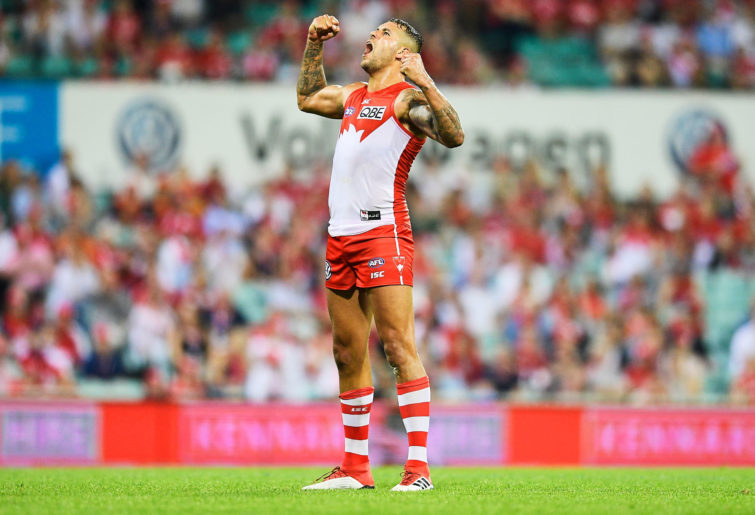
(Brett Hemmings/AFL Media/Getty Images)
Forward 5: Dane Swan (Collingwood) 2010-16
2010: 126.9 (22)
2011: 122.0 (21)
2012: 126.2 (18)
2013: 117.3 (22)
2014: 86.4 (17)
2015: 105.9 (21)
2016: 0 (1)
A gruesome foot injury prematurely ended Swanny’s career, but before that he was a SuperCoach king. Three seasons of 120-plus averages to start the decade as well as two more respectable seasons of 126 and 106. There was only one ‘bad’ season in 2014, and also obviously the injury in 2016 in the first minutes of Round 1.
Forward 6: Travis Boak (Port Adelaide) 2010-19
2010: 96.8 (20)
2011: 90.4 (21)
2012: 90.0 (18)
2013: 106.6 (21)
2014: 105.7 (21)
2015: 99.1 (22)
2016: 91.3 (22)
2017: 85.1 (21)
2018: 88.0 (22)
2019: 107.2 (21)
Travis Boak has been a consistent yet rarely spectacular performer for the last decade. Three seasons of over 105 points and only two that dip below 90 shows he can be a reliable option. He looked to have past his best, but 2019 he came back refreshed and had his best season this decade.
Forward 7: Patrick Ryder (Essendon and Port Adelaide) 2010-19
2010: 85.7 (21)
2011: 90.9 (22)
2012: 105.5 (15)
2013: 90.2 (17)
2014: 101.1 (20)
2015: 85.4 (18)
2016: 0 (0)
2017: 103.0 (21)
2018: 90.3 (16)
2019: 82.7 (17)
Paddy offers the ability to dominate in the ruck and swing forward to provide a marking and goalkicking presence. He had three 100-plus seasons with three more in the 90s. He missed all of 2016 due to the doping ban, but he’ll slot right into the decade rat pack with Dusty and Swanny.
Forward 8: Jarryd Roughead (Hawthorn) 2010-19
2010: 77.7 (22)
2011: 101.5 (11)
2012: 103.7 (20)
2013: 98.5 (22)
2014: 95.8 (20)
2015: 96.3 (20)
2016: 0 (0)
2017: 86.5 (22)
2018: 83.7 (20)
2019: 72.5 (8)
I originally had Luke Parker in this spot, but turns out he played only one season as a forward this decade. I personally thought he had more years as a dual-position player, but what are you going to do? Roughy sneaks in as the last player selected with two 100-plus seasons, three season in the 90s and a couple of years in the 80s. He missed a whole season due to a torn Achilles, but his work across the rest of the decade is much better than forwards below him. It’s slim pickings after him.
What are your thoughts Roarers? Who did I miss?